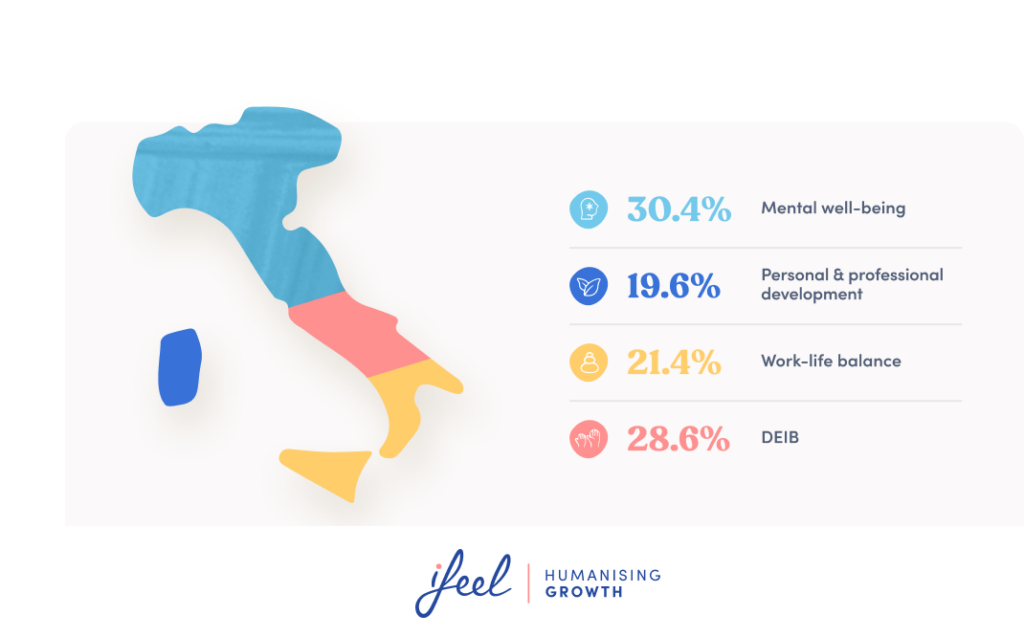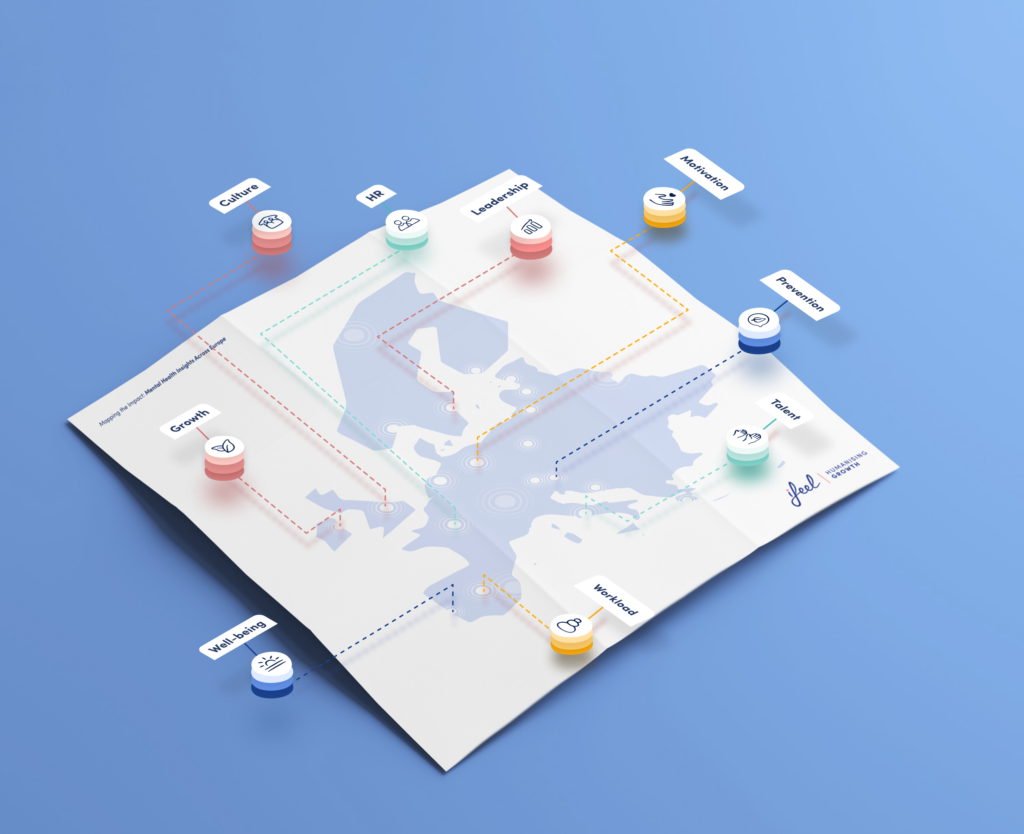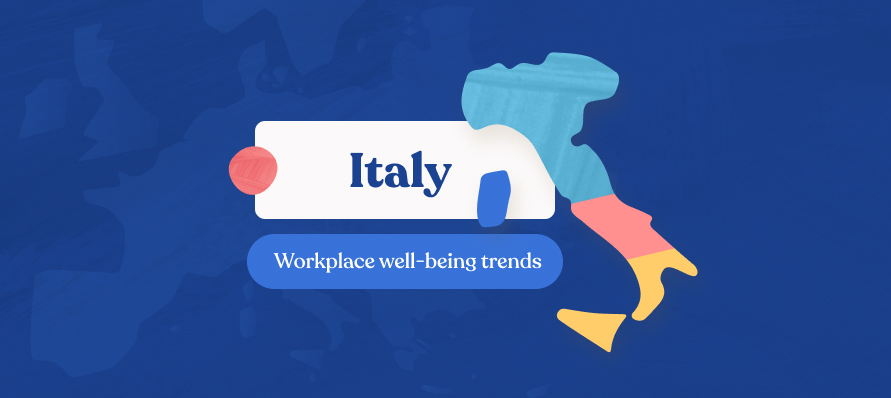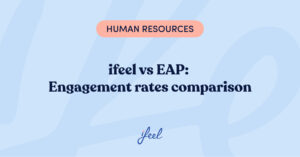Italy’s workplace well-being: A European comparison
Across Europe, employee mental well-being is at the heart of corporate strategies as companies strive to support their workforce and enhance productivity. Italy, with its distinctive cultural and economic background, presents a unique set of challenges and opportunities in this area. How does Italy compare to the rest of Europe regarding fostering workplace well-being?
Our latest research provides in-depth insights into the mental health landscape in Italy, offering actionable strategies for employers. Let’s explore the key trends across mental well-being, work-life balance, diversity, equity, inclusion, and belonging (DEIB), and personal and professional development.
👉 Want to go further? Download our free whitepaper, ‘Mapping the Impact,’ for exclusive insights on workplace well-being across Europe.
The trends shaping well-being in Italy’s workplaces
Our analysis focuses on four core categories that play a significant role in employee well-being and performance:
- Mental well-being: Anxiety, depression, stress
- Work-life balance: Family responsibilities, maternity/paternity, sleep
- DEIB: LGBTQA+ inclusion, disability, sexuality
- Personal & professional development: Skill growth, career progression
By understanding these categories, employers in Italy can better address the needs of their employees and foster a healthier, more supportive workplace.
Breaking down well-being across Europe
- Mental well-being (38%)
Mental health remains the top concern across Europe, with 38% of employees prioritising mental well-being. Approximately 10% of Europeans experience anxiety, depression, or other mental health challenges, emphasising the importance of mental health support in the workplace. - Work-life balance (22%)
Work-life balance continues to be a priority for European employees, with 22% identifying it as a key issue. The demand for more flexible work arrangements reflects the growing challenge of juggling personal responsibilities alongside professional duties. - Personal & professional development (24%)
European employees are focused on growth, with 24% seeking opportunities for personal and professional development. Continuous learning and skill acquisition are critical for job satisfaction and improving mental health. - DEIB (15%)
Diversity, equity, inclusion, and belonging initiatives are becoming increasingly important across Europe, with 15% of employees calling for more inclusive and supportive workplace environments.
Italy’s well-being landscape: A closer look
Let’s take a closer look at how Italy compares to the European averages in these key areas and what employers can do to support their workforce.

Mental eell-being: 30.4% (Italy) vs. 38% (Europe)
Italy shows a lower demand for mental well-being support, with only 30.4% of employees seeking mental health resources compared to the European average of 38%. Cultural factors and a lower investment in mental health services in Italy may contribute to this disparity. Additionally, the stigma surrounding mental health in the country may lead to underreporting and a reluctance to seek help.
Implications for employers:
Italian companies should work to destigmatise mental health by fostering a culture of openness and offering accessible mental health resources. Workplace well-being programs, such as those provided by ifeel, can help bridge the gap between employee needs and the support currently available. Encouraging conversations about mental health and providing tangible support options can make a significant difference.
Work-life balance: 22% (Italy) vs. 22% (Europe)
Work-life balance concerns in Italy are in line with the European average. As in many other countries, the pandemic has reshaped the work environment in Italy, driving demand for flexible schedules and remote work options.
Implications for employers:
To improve work-life balance, Italian employers should continue to promote flexible working arrangements, such as remote work or adaptable hours. Encouraging employees to take time for themselves and manage their workloads effectively will lead to a more satisfied and productive workforce.
Personal & professional development: 24% (Italy) vs. 24% (Europe)
The demand for personal and professional development in Italy is consistent with the European average, with 24% of employees seeking opportunities for career advancement. This shows that Italian workers are eager to grow their skills and enhance their careers, a critical factor for job satisfaction.
Implications for employers:
Investing in professional development programs such as training, mentorship, and career growth opportunities is essential for keeping Italian employees engaged and motivated. These initiatives will also help them adapt to the evolving job market, boosting overall workplace performance.
DEIB: 28.6% (Italy) vs. 16% (Europe)
Italy shows a significantly higher demand for DEIB initiatives, with 28.6% of employees emphasising the importance of diversity, equity, inclusion, and belonging—nearly double the European average. This reflects a strong push within Italian workplaces for more inclusive environments that value diversity and foster belonging.
Implications for employers:
Italian employers should seize this opportunity to lead in DEIB by implementing comprehensive policies that promote inclusion, equity, and diversity. Effective initiatives could include inclusive hiring practices, diversity training, and the establishment of employee resource groups. Prioritising DEIB efforts will not only improve workplace culture but also reduce stress and boost mental well-being by creating a sense of belonging among employees.

Driving positive change in Italy’s workplaces
Overall, the data for Italy highlights a unique landscape where a robust push for DEIB initiatives contrasts with a relatively lower demand for mental health support. Addressing these trends thoughtfully can help Italian companies build more inclusive and supportive workplaces while responding effectively to the nuanced needs of their workforce.
To gain a deeper understanding of the mental health landscape in Europe, download the full report here.
Investing in employee well-being is not just a matter of compliance or corporate social responsibility; it is a strategic decision that can help companies thrive in an increasingly competitive and globalised market.
To assist in this process, our team of psychologists specialising in mental well-being has developed a mental well-being solution for large organisations aimed at helping companies enhance employee engagement and boost productivity.
This collaboration allows HR managers to receive personalised, data-based advice on the most effective measures for detecting employee mental health issues and assessing the workplace climate. It’s the best way to understand their needs.
We hope you found this article on key mental well-being trends in Italy interesting. If you want more information about our mental well-being solution for companies, simply request it, and we will contact your team soon.







